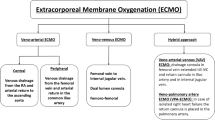Abstract
Extracorporeal membrane oxygenation (ECMO) has been used now for more than four decades, and although initial clinical use and evidence were controversial of its benefit, technological advances in the components of the circuit, increase clinical experience, and further clinical evidence in the past decade have increased the number of centers that have employed this technology. ECMO employed as a rescue treatment for refractory respiratory failure has gained increasing support due to improvement in technology and emerging clinical evidence. The main indication for ECMO for respiratory failure is ARDS due to infection; however, recently there has been an increase in the use of ECMO for decompensated end-stage respiratory failure in patients awaiting lung transplantation. Possible contraindications for ECMO are inability to anticoagulate and the presence of malignancy. The current evidence has shown optimistic survival rates as well as quality of life that justify its use for refractory respiratory failure.


Similar content being viewed by others
References
Papers of particular interest, published recently, have been highlighted as: • Of importance
Combes A, Bacchatta M, Brodie D, et al. Extracorporeal membrane oxygenation for respiratory failure in adults. Curr Opin Crit Care. 2012;18:99–104.
ECMO Registry of the Extracorporeal Life Support Organization (ELSO) website, Ann Arbor Michigan https://elso.org. Accessed 24 July 2015.
• Peek GJ, Mugford M, Tiruvoipati R, et al.; For the CESAR trial. Efficacy and economic assessmet of conventional ventilatory support versus extracorporeal membrane oxygenation for sever adult respiratory failure (CESAR): a multicentre randomized controlled trial. Lancet 2009;374:1351–63. Randomized controlled trial that evaluate mortality for respiratory failure, which showed improved mortality.
• Davies A, Jones D, Bailey M, et al.; Australia and New Zealand Extracorporeal Membrane Oxygenation(ANZ ECMO) Influenza Investigators. Extracorporeal membrane oxygenation for 2009 influenza A (H1N1) acute respiratory distress syndrome. JAMA. 2009;302(17):1888–95. Randomized controlled trial that evaluated the use of ECMO during the influenza pandemia of 2009.
Murray JF, Matthay MA, Luce JM, et al. An expanded definition of the adult respiratory distress syndrome. Am Rev Respir Dis. 1988;138(3):720–3.
Rubenfeld GD, For the ARDS Definition Task Force. Acute respiratory distress syndrome: the Berlin definition. JAMA. 2012;307(23):2526–33.
Schmidt M, Bailey M, Sheldrake J, et al. Predicting survival after extracorporeal membrane oxygenation in severe acute respiratory failure, the respiratory extracorporeal membrane oxygenation survival (RESP) score. AJRCCM. 2014;189:1374–82.
Veith FJ. Lung transplantation. Transplant Proc. 1977;9(1):203–8.
Hoopes CW, Kukreja J, Golden J. Extracorporeal membrane oxygenation as a bridge to pulmonary transplantation. J Thorac Cardiovasc Surg. 2013;145:682–7.
Tayama E, Hayashida N, Akasu K, et al. Biocompatibility of heparin-coated extracorporeal bypass circuits: new heparin bonded bioline system. Artif Organs. 2000;24:618–23.
Hemmila MR, Rowe SA, Boules TN, et al. Extracorporeal life support for severe acute respiratory distress syndrome in adults. Ann Thorac Surg. 2004;240:595–605.
Aubron C, Cheng AC, Pilcher D et al: Factors associated with outcomes of patients on extracorporeal membrane oxygenation support: a 5-year cohort study. Crit Care. 2013;17:R73. http://ccforum.com/content/17/2/R73.
Jones N, Harris S, Cordle C. Long-term results of ECMO for adult respiratory failure. In: Van Meurs K, Lally KP, Peek GJ, et al., editors. ECMO extracorporeal cardiopulmonary support in critical care. 3rd ed. Ann Arbor: Extracorporeal Life Support Organization; 2005. p. 417–30.
Schmidt M, Zogheib E, Roze H. The PRESERVE mortality risk score and analysis of long-term outcomes after extracorporeal membrane oxygenation for severe acute respiratory distress syndrome. Int Care Med. 2013;39(10):1704–13.
Author information
Authors and Affiliations
Corresponding author
Additional information
This article is part of the Topical Collection on Critical Care Anesthesia.
Rights and permissions
About this article
Cite this article
Razo Vazquez, A., Ramsay, J. Extracorporeal Membrane Oxygenation for Refractory Respiratory Failure. Curr Anesthesiol Rep 5, 380–386 (2015). https://doi.org/10.1007/s40140-015-0139-0
Published:
Issue Date:
DOI: https://doi.org/10.1007/s40140-015-0139-0




